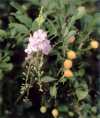 |
 |
 |
 |
 |
flowers
Their Spiritual significance
Photo Collection
Aspiration for vital purity
Duranta erecta L. (Verbenaceae)
Golden dewdrops
Lavender
Purity is to accept no other influence but only the influence of the Divine.
Sri Aurobindo
Sri Aurobindo. Sri Aurobindo Birth Centenary Library in 30 Volumes. - Volume 23. - Letters on Yoga.-P.2-3
One is truly perfectly pure only when the whole being, in all its elements and all its movements, adheres fully, exclusively, to the divine Will. This indeed is total purity. It does not depend on any moral or social law, any mental convention of any kind. It depends exclusively on this: when all the elements and all the movements of the being adhere exclusively and totally to the divine Will.
The Mother
The Mother. Collected Works of the Mother.- Volume 6. - Questions And Answers (1954)
What I call purity, the true purity, is not all those things morality teaches: it is non-ego.
There must be nothing but Him.
Him, not only because we have given Him everything and consecrated ourselves totally to Him (that is not enough), but Him because He has taken total possession of the human instrument.
The Mother
The Mother. Agenda. - Volume 1. - 1951-1960
There is a force of purity, not the purity of the moralist, but an essential purity of spirit, in the very substance of the being.
Sri Aurobindo
Sri Aurobindo. Sri Aurobindo Birth Centenary Library in 30 Volumes. - Volume 24. - Letters on Yoga.-P.4
Look what I've received (Mother hands a garland of jasmine), you'll give it to Sujata - it smells nice!
The Mother
The Mother. Agenda. - Volume 4. - 1963
This is purity, to accept no other influence but only the influence of the Divine.
The Mother
The Mother. Collected Works of the Mother.- Volume 14. - Words of the Mother
get the higher consciousness, its light and the workings of its power down into the obscurer parts of the nature
Sri Aurobindo
Sri Aurobindo. Sri Aurobindo Birth Centenary Library in 30 Volumes. - Volume 24. - Letters on Yoga.-P.4
Sweet Mother, how can we empty the consciousness of its mixed contents?
"Keep the quietude and do not mind if it is for a time an empty quietude; the consciousness is often like a vessel which has to be emptied of its mixed or undesirable contents; it has to be kept vacant for a while till it can be filled with things new and true, right and pure." (Sri Aurobindo. Sri Aurobindo Birth Centenary Library in 30 Volumes. - Volume 23. - Letters on Yoga.-P.2-3)
By aspiration, the rejection of the lower movements, a call to a higher force. If you do not accept certain movements, then naturally, when they find that they can't manifest, gradually they diminish in force and stop occurring. If you refuse to express everything that is of a lower kind, little by little the very thing disappears, and the consciousness is emptied of lower things. It is by refusing to give expression – I mean not only in action but also in thought, in feeling. When impulses, thoughts, emotion come, if you refuse to express them, if you push them aside and remain in a state of inner aspiration and calm, then gradually they lose their force and stop coming. So the consciousness is emptied of its lower movements.
But for instance, when undesirable thoughts come, if you look at them, observe them, if you take pleasure in following them in their movements, they will never stop coming. It is the same thing when you have undesirable feelings or sensation: if you pay attention to them, concentrate on them or even look at them with a certain indulgence, they will never stop. But if you absolutely refuse to receive and express them, after some time they stop. You must be patient and very persistent.
In a great aspiration, if you can put yourself into contact with something higher, some influence of your psychic being or some light from above, and if you can manage to put this in touch with these lower movements, naturally they stop more quickly. But before even being able to draw these things by aspiration, you can already stop those movements from finding expression in you by a very persistent and patient refusal. When thoughts which you do not like come, if you just brush them away and do not pay them any attention at all, after some time they won't come any longer. But you must do this very persistently and regularly.
The Mother
The Mother. Collected Works of the Mother.- Volume 6. - Questions And Answers (1954)
the rejection of the lower movements, a call to a higher force.
The Mother
The Mother. Collected Works of the Mother.- Volume 6. - Questions And Answers (1954)
Aspiration
[Aspiration] is the call of the being for higher things - for the Divine, for all that belongs to the higher or Divine Consciousness.
Sri Aurobindo
Sri Aurobindo. Guidance from Sri Aurobindo.- I.- Pondicherry: Sri Aurobindo Society, 1974, P.106.
This taste for supreme adventure is aspiration - an aspiration which takes hold of you completely and flings you, without calculation and without reserve and without a possibility of withdrawal, into the great adventure of the divine discovery, the great adventure of the divine meeting, the yet greater adventure of the divine Realisation.
The Mother
The Mother. Collected Works of the Mother.- Volume 8. - Questions And Answers (1956)
Aspiration is like an arrow, like this (gesture). So you aspire, want very earnestly to understand, know, enter into the truth. Yes? And then with that aspiration you do this (gesture). Your aspiration rises, rises, rises, rises straight up, very strong and then it strikes against a kind of... how to put it? ... lid which is there, hard like iron and extremely thick, and it does not pass through. And then you say, "See, what's the use of aspiring? It brings nothing at all. I meet with something hard and cannot pass!" But you know about the drop of water which falls on the rock, it ends up by making a chasm: it cuts the rock from top to bottom. Your aspiration is a drop of water which, instead of falling, rises. So, by dint of rising, it beats, beats, beats, and one day it makes a hole, by dint of rising; and when it makes the hole suddenly it springs out from this lid and enters an immensity of light, and you say, "Ah, now I understand."
It's like that.
The Mother
The Mother. Collected Works of the Mother.- Volume 7. - Questions And Answers (1955)
Aspiration is needed but there can be a sunlit aspiration full of light and faith and confidence and joy.
Sri Aurobindo
Sri Aurobindo. Sri Aurobindo Birth Centenary Library in 30 Volumes. - Volume 24. - Letters on Yoga.-P.4
Well, today there is something special. And these two flowers are just fine: Concentration in the Aspiration... But do you know how to aspire? Do you aspire a little?
Do you know where the aspiration comes from?
Yes, Mother, from the heart and from the psychic.
Yes, my little one, rather from the psychic, the true aspiration comes from there; but one first starts from the heart.
As long as you are not in contact with it, in the beginning you can aspire from the mind, saying: Ma, Ma, Ma, Ma, and asking precisely what you want, as, for example, Peace, or let Peace be established within me. Then you silently concentrate and you remain open. You will see that you will be flooded with Peace.
Then you concentrate in the heart, and you aspire to come into contact with the flame, the psychic flame, the flame of purification and go there, very deeply, and remain silent and open like this (Mother opens Her hands like a flower above Her head).
Once there - but you must sincerely make a great effort to find it, - you are in contact with the central being; everything else becomes silent, and one has the feeling that the Divine is doing everything for oneself. An immutable joy and peace and freedom then seize you. And nothing in the world is interesting any more, but the aspiration that unites with the Divine.
The vital has to be carefully distinguished from mind, even though it has a mind element transfused into it; the vital is the Life-nature made up of desires, sensations, feelings, passions, energies of action, will of desire, reactions of the desire-soul in man and of all that play of possessive and other related instincts, anger, fear, greed, lust, etc. , that belong to this field of the nature.
Sri Aurobindo
Sri Aurobindo. Sri Aurobindo Birth Centenary Library in 30 Volumes. - Volume 22. - Letters on Yoga.-P.1
The vital proper is the life-force acting in its own nature, impulses, emotions, feelings, desires, ambitions, etc. , having as their highest centre what we may call the outer heart of emotion, while there is an inner heart where are the higher or psychic feelings and sensibilities, the emotions or intuitive yearnings and impulses of the soul. The vital part of us is, of course, necessary to our completeness, but it is a true instrument only when its feelings and tendencies have been purified by the psychic touch and taken up and governed by the spiritual light and power.
Sri Aurobindo
Sri Aurobindo. Sri Aurobindo Birth Centenary Library in 30 Volumes. - Volume 22. - Letters on Yoga.-P.1
There are four parts of the vital being - first, the mental vital which gives a mental expression by thought, speech or otherwise to the emotions, desires, passions, sensations and other movements of the vital being; the emotional vital which is the seat of various feelings, such as love, joy, sorrow, hatred, and the rest; the central vital which is the seat of the stronger vital longings and reactions, e. g. ambition, pride, fear, love of fame, attractions and repulsions, desires and passions of various kinds and the field of many vital energies; last, the lower vital which is occupied with small desires and feelings, such as make the greater part of daily life, e. g. food desire, sexual desire, small likings, dislikings, vanity, quarrels, love of praise, anger at blame, little wishes of all kinds - and a numberless host of other things. Their respective seats are: (1) the region from the throat to the heart, (2) the heart (it is a double centre, belonging in front to the emotional and vital and behind to the psychic), (3) from the heart to the navel, (4) below the navel.
Sri Aurobindo
Sri Aurobindo. Sri Aurobindo Birth Centenary Library in 30 Volumes. - Volume 22. - Letters on Yoga.-P.1
When there is this death of desire and this calm equal wideness in the consciousness everywhere, that the true vital being within us comes out from the veil and reveals its own calm, intense and potent presence. For such is the true nature of the vital being, prānamaya purusa; it is a projection of the Divine Purusha into life, - tranquil, strong, luminous, many-energied, obedient to the Divine Will, egoless, yet or rather therefore capable of all action, achievement, highest or largest enterprise. The true Life-Force too reveals itself as no longer this troubled harassed divided striving surface energy, but a great and radiant Divine Power, full of peace and strength and bliss, a wide-wayed Angel of Life with its wings of Might enfolding the universe.
Sri Aurobindo
Sri Aurobindo. Sri Aurobindo Birth Centenary Library in 30 Volumes. - Volumes 20-21. - The Synthesis of Yoga
There is behind all the vital nature in man his true vital being concealed and immobile which is quite different from the surface vital nature. The surface vital is narrow, ignorant, limited, full of obscure desires, passions, cravings, revolts, pleasures and pains, transient joys and griefs, exultations and depressions. The true vital being, on the contrary, is wide, vast, calm, strong, without limitations, firm and immovable, capable of all power, all knowledge, all Ananda. It is moreover without ego, for it knows itself to be a projection and instrument of the Divine: it is the divine Warrior, pure and perfect; in it is an instrumental Force for all divine realisations.
Sri Aurobindo
Sri Aurobindo. Sri Aurobindo Birth Centenary Library in 30 Volumes. - Volume 22. - Letters on Yoga.-P.1